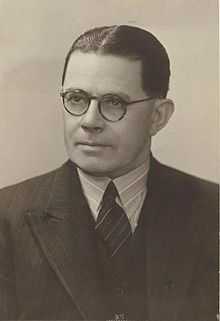Oliver Badman
| Albert Oliver Badman | |
|---|---|
 | |
| Senator for South Australia | |
| In office 1 July 1932 – 30 September 1937 | |
| Succeeded by | Philip McBride |
| Member of the Australian Parliament for Grey | |
| In office 23 October 1937 – 21 August 1943 | |
| Preceded by | Philip McBride |
| Succeeded by | Edgar Russell |
| Personal details | |
| Born | 18 December 1885 Yacka, South Australia |
| Died | 24 April 1977 (aged 91) |
| Nationality | Australian |
| Political party | Country (1931–40) UAP (1940–43) |
| Occupation | Farmer, preacher |
| Religion | Methodist |
Albert Oliver Badman (18 December 1885 – 24 April 1977) was an Australian politician. Born in Yacka, South Australia, he was educated at state schools before becoming a wheat farmer and wheat breeder. He was a Methodist lay preacher and President of the South Australian Country Party before entering Parliament. In 1931, he was elected to the Australian Senate for South Australia, representing the Country Party. In 1937, Badman transferred to the House of Representatives, winning the seat of Grey. The United Australia Party (UAP) did not contest the seat as the Country Party had agreed to allow the UAP's sitting member for Grey, Philip McBride, to take Badman's place in the Senate. Together with fellow Country Party members Arthur Fadden, Bernard Corser and Thomas Collins, Badman dissociated himself from party leader Earle Page after the latter made attacks on the leader of the UAP, Robert Menzies; the exclusion of these four led to the election of Page supporter Archie Cameron as the party's next leader. In 1940, Cameron defected to the UAP, and the Country Party in South Australia ceased to exist; Badman became, in effect, a UAP member. He was defeated in 1943, and returned to farming. He was President of the Primary Producers' Union of South Australia from 1954 to 1961. Badman died in 1977.[1]
References
- ↑ Carr, Adam (2008). "Australian Election Archive". Psephos, Adam Carr's Election Archive. Retrieved 2008-08-02.
| Parliament of Australia | ||
|---|---|---|
| Preceded by Philip McBride |
Member for Grey 1937 – 1943 |
Succeeded by Edgar Russell |